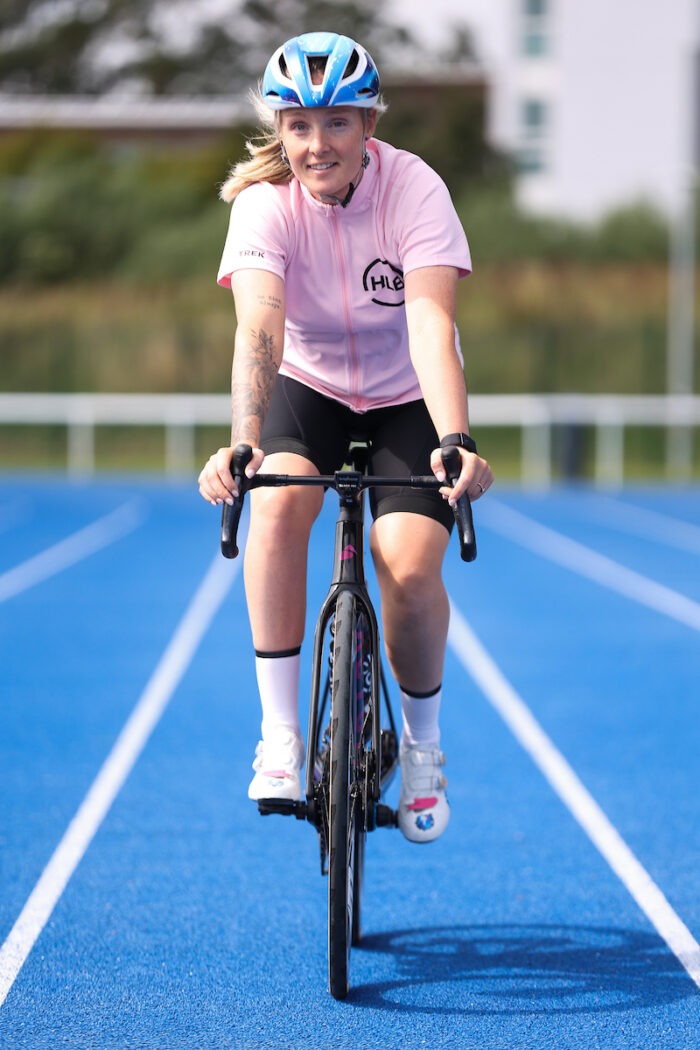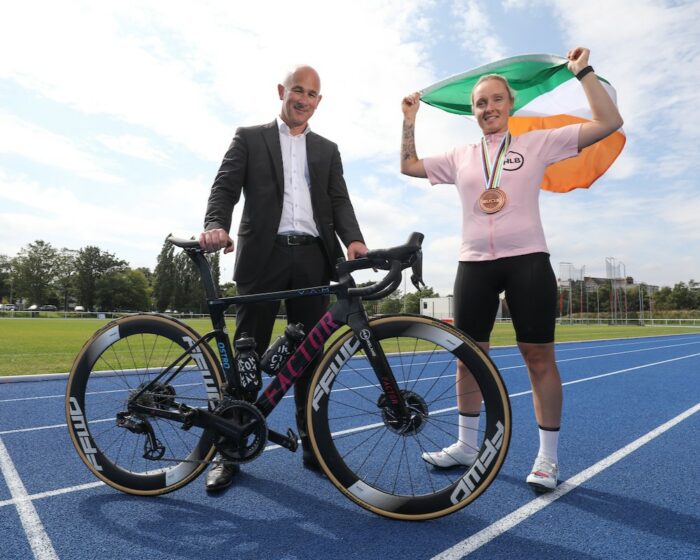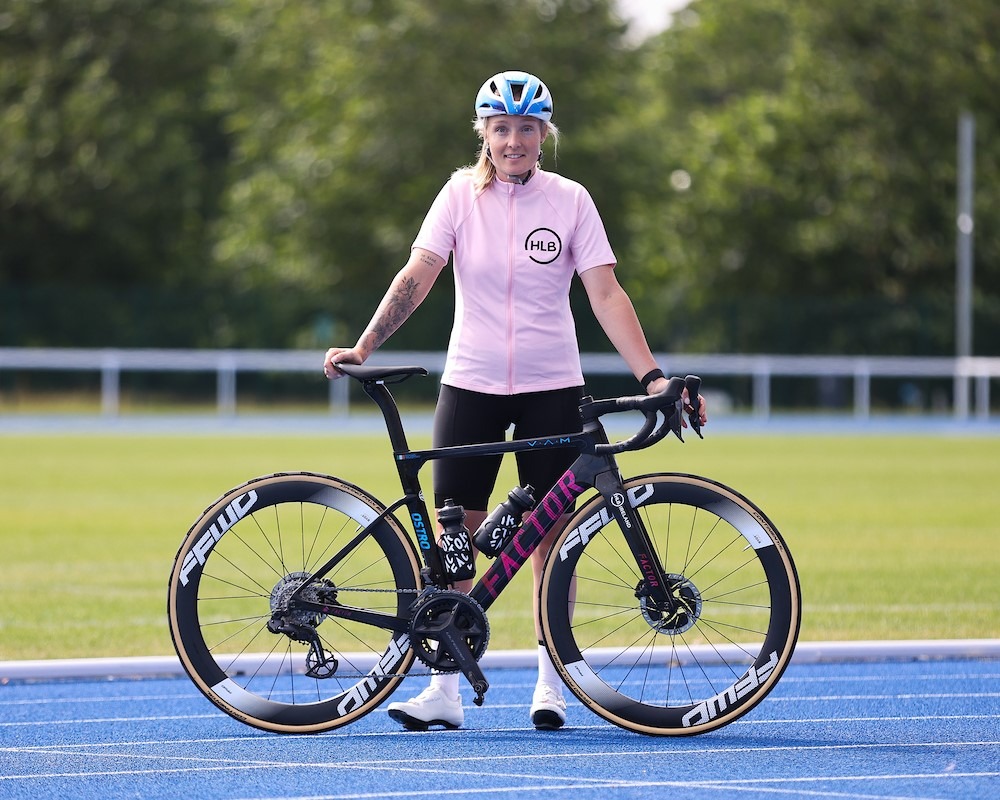All eyes will be on Paris this summer as the Olympic and Paralympic Games take over the City of Lights. Irish sportswoman and Para athlete Richael Timothy will be travelling to the French capital to compete for Ireland in the individual cycling event. Having defied the odds in many ways, she’s going “all in” to make this a Games to remember.
Some might call Timothy an all-rounder, but they’d be selling her short. She represented her native Roscommon in Gaelic football and Ireland as an accomplished U15 and U17 soccer player, alongside current Irish captain Katie McCabe.
Dreams of pursuing a professional sporting career took a devastating blow in 2016 when an acquired brain injury left her without any power on the right side of her body. “I had what I thought was a chest infection. And it just wasn’t going away. I was getting a bit short of breath playing football. My GP suggested an x-ray, which showed abnormal blood vessels.”
Timothy was diagnosed with a rare condition called HHT (Hereditary Hemorrhagic Telangiectasia) which affects veins and arteries. “It was decided that we do radiotherapy on the [abnormal blood vessel] in my brain and it accidentally hit the wrong part, causing swelling, which led to the brain injury. So it wasn’t the rare condition that caused the brain injury necessarily, it was the treatment of it.”
It was deeply shocking outcome for the aspiring sports star. “I look back and think if I hadn’t had it treated nothing might have come of it, but because I did I’m left with a brain injury.”
Timothy had to learn to walk and talk again. “It was similar to stroke rehab. I thought I’d be back in two weeks. Once the swelling goes I’d be back to normal, but I was so naive. I didn’t realise it’s permanent damage. So I had to adjust everything I was doing to what I could do. It probably took two years to realise that I have to go from where I am now and not go back to the way I was.”
“I felt like I needed to find a sport and was told by doctors that it wasn’t an option.”
Until this point, sport had defined Timothy’s life. “I was always into some kind of sport. I did sports science in college. I felt like I needed to find a sport and was told by doctors that it wasn’t an option.”
In 2018, just two years into her recovery, she tried cycling an old bike out of boredom. “I had really bad fatigue at that time. I would walk 500 metres and it would be too much, whereas the bike was less weight bearing and less intense and it got me outdoors.” Discovering she qualified as a Para athlete saw her “competitive side come out again”.
Attending competitions every month for a year saw Timothy progress and helped her to tap back into her sports training. “You can train people to be good, but if you have a natural interest or talent in sport it can give you an advantage. I got called up to the Irish team.I showed initiative that I was willing to go all in and they gave me a chance. I’ve been there ever since.
“It was instilled into me as a child that you can make money when you’re older. If you want to do something you go after it and do it. You are only going to do this for so many years of your life. And with the brain injury, the fact is you might not live to 40; you don’t know how long you’ll be here. There’s no point leaving money behind and not having done anything with your life. I’d rather live in the moment and go all in and think about that later.”

Riding in the Women’s C3 category on both track and road, Timothy’s bike has been adapted so everything is on the left-hand side. “I’m pedalling 70 per cent from my left-hand side. But you are able to do that in cycling, you can pedal unevenly, whereas in other sports, you need 50:50.”
Training is rigorous and there have been moments of doubt. “I’m not like able-bodied athletes who can train every day. For Para athletes, many of us have to do less in order to do more. Some days, because of the brain injury, I have really bad fatigue and have to go to sleep for the day to reset my body.”
2020 presented further setbacks. “A few injuries, sickness, Covid, different things that took me a lot longer than it would take someone without a compromised system to recover from. I thought then maybe it was too much because I was obviously at the elite level. I was trying to get better but I was struggling to stay at that level. There was a change to the programme. We got a new coach and it gave me a fresh start. Then last year was one of my best years, internationally.”
Timothy won two bronze medals at the Para-cycling Track World Championships. “That gave me the boost to know I was still getting faster, and that for me – being so competitive – I didn’t want to just take part, I wanted to be up there in the race. So I knew if I’m not up there, then I don’t want to do it anymore.”
Training on and off the bike
Training includes 20 hours a week on the bike, but Timothy believes it’s what you do off the bike that really counts. “Your recovery, nutrition, sleep, all of these things contribute to how well you go on the bike. That’s the most important thing. You can train but if you don’t recover and get ready for the next session, then you’re not going to come out well. I’m a full-time athlete. Technically, it’s my job, it’s what I do. I’m doing the same training as an able-bodied athlete but I probably have to do more on the recovery and rehabilitation side because my body doesn’t work 50:50.
“Some people think Para is slower or a weaker form of the Olympics, but I’m racing with able-bodied athletes in Ireland so I’m the standard.”
Visibility matters to Timothy, who participated in the Dare to Believe program, visiting schools to share her experiences. As a guest speaker for Sport Ireland’s Let’s Get Visible campaign, she emphasised the importance of LGBTQI+ engagement in sports, reflecting a commitment to diversity and inclusion in the sporting community.
“I didn’t know much about Paralympics until I got into it. Everyone has a story about what they’ve overcome or what they’ve had to live with. It just shows the power of sport and how you can do it no matter your level. It’s for everyone and that’s inspiring.”
A sponsorship that “resonates”
Speaking in a school in Greystones, Timothy met Mark Butler, Managing Partner of HLB Ireland, a leading advisory and accounting firm working with domestic and overseas businesses. Inspired by her story, Butler offered sponsorship on the spot. “Richael Timothy’s journey resonates deeply with us at HLB Ireland due to her exceptional display of determination, hard work, and resilience. Her passion for her sport and her ability to overcome significant challenges reflect the core values we uphold within our teams.”
Sponsorship came at a crucial time for Timothy, who needed a bike upgrade to take her sport to the next level. “Unfortunately for me, as my parents said when I started, I had to choose the most expensive sport because you need a bike, equipment and you need to transport the bike everywhere.

“I was shocked when Mark approached me because up ’til then it would have been a few vouchers, that sort of stuff. I’m at the level that your equipment can be the difference between winning and losing. I knew I’d be able to use that toward Paris and then you couldn’t have the excuse that it was the equipment. He was taking that weight off my shoulders. I give back to them by showing what can be done as a female athlete in sport first, and then from a position of disability as well.
“It’s good to see they’ve supported the minority. It’s easy for companies like HLB to give Kellie Harrington however much because they know her face is going to be everywhere and it’s going to obviously promote their business. But with me, I’m probably training my hardest, but it doesn’t necessarily mean I’m going to win a medal.
“The best I could ever do might be fourth place. Funding someone that’s lower down the rankings might actually help them get their ranking up. It’s important for businesses looking to sponsor athletes to get someone’s story rather than judge them off the amount of followers they have on social media.”
With Paris on the horizon, Timothy is reflecting on her achievements to date. “At the first para-cycling competition in Manchester, someone said to me, this could be the best thing that ever happened to you. In my head, I thought no, the best thing would be if I could go back and play football. I still thought I was going to recover.
“But now, looking back it probably was the best thing that happened to me because I wouldn’t have had the opportunity to be a full-time athlete. I wouldn’t have been able to represent my country. There are people with brain injuries that decide they’re done and are not going to do anything. But that wasn’t an option for me. I needed to do something. I got on a bike when I was told it’s probably the least safe thing you could do. I did it anyway.”
In celebration of International Women’s Day this article has been produced in association with HLB Ireland.


